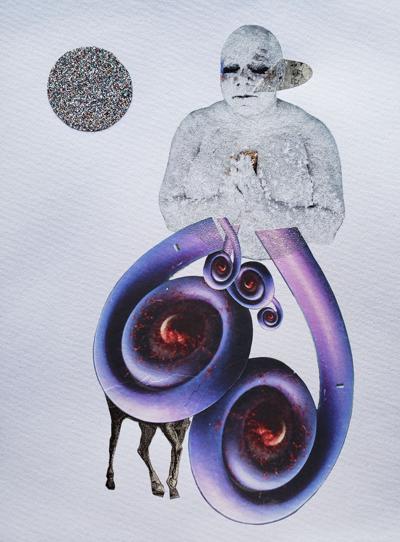
Michaela Pilar Brown’s Untitled 1
The influential founder of analytical psychology, Carl Jung, avowed that “water is the commonest symbol for the unconscious.” What better point of reference, then, for the artist, whose creative act gives form to the forces from within?
Consider the current show by Columbia-based multimedia artist Michaela Pilar Brown. Now on view at if ART Gallery, Water Memory is the artist’s response, from without and within, to her recent residency at the Whakatāne Museum on New Zealand’s North Island. The 30 small works on display can be divided into two categories: 19 mixed-media landscapes on canvas and paper and 11 textured collages.
The landscapes blend observation with a personal emotional response to what was viewed. From her temporary residence on the often-misty shores of the Bay of Plenty, Brown had access to volcanic mountains and geothermal springs. Using water media — in this case, thinned acrylic — and certain non-traditional materials, she captured on canvas and paper some of the molten configurations of both land and water.
The visual atmosphere of these landscapes is achieved, in part, by the use of nontraditional materials. For example, the artist has confessed to taking a piece of home with her everywhere she travels. To New Zealand, Brown transported some mica from Fairfield County; the application of this mineral to the surface of some of these images adds a reflective quality as luminous as lava flow.
The minimalist collages tell the story of Brown’s personal voyage from America to New Zealand and that of countless transnational migrations over time, some voluntary and some forced. In the work entitled Farewell, for example, the artist in profile, her bare torso chalk-encrusted, lifts up a gilded lamb’s heart as an offering to some unseen recipient. Behind her is the image of a cargo ship and a page from a religious text. Is this a reference to the plight of New Zealand’s native people, the Maori, who sacrificed their land and traditions to the conquering British and their Christianizing missionaries? Sailing the vast ocean in quest of empire, Europeans often decimated indigenous populations and severed those few individuals that survived from their language and customs. Only about 5 percent of the population of New Zealand today speaks a native tongue.
Much the same can be said of a tragic part of the American experience — Native Americans were Europeanized by force, while transplanted Africans severed from their traditional cultural practices, which endured, if at all, in secret. In Directions, a companion piece of sorts to Farewell, two images of the artist, positioned face to face, enter into a transference of resonant material. The dark figure on the right offers to the chalked figure on the left a bouquet of Fiddlehead ferns, native to both North America and New Zealand, topped with a garnish of cargo ship. Both figures are partially covered in glitter — the right in black and the left in silver — as if one emerged from the side of the planet where night dwells to the side where it is now day, replicating the artist’s own voyage of 8,000 miles from one side of the Earth to the other.
A few of the visual elements in the works that make up Water Memory will be familiar to those who have experienced some of the artist’s previous shows, such as I’m a boss my house, featured at if ART Gallery in the spring of 2016. Love and Hate incorporates, for example, a baby doll and a gun, both references to our country’s gun culture and the fact that approximately 1,000 children die each year in the United States as victims of gun violence. In this particular image, a baby doll forms the handle of the pistol on the right, whose projectile hurtles left toward the gilded sheep’s heart held in a giant hand. Is this the death of innocence or death by innocence?
The moody landscapes and often-provocative collages that constitute Water Memory advance Michaela Pilar Brown’s already impressive artistic resume. Visitors to If ART Gallery this month will be glad that they were invited on her continuing journey.







